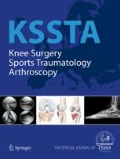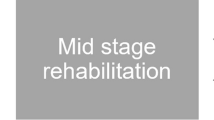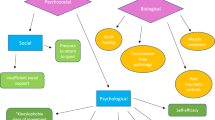Abstract
Purpose
The purpose of this study was to evaluate the influence of individual characteristics on rotational knee laxity in healthy participants. Our second aim was to verify whether the contralateral knee of patients with a non-contact ACL injury presents greater rotational knee laxity than a healthy control group.
Methods
Sixty healthy participants and 23 patients having sustained a non-contact ACL injury were tested with a new Rotameter prototype applying torques up to 10 Nm. Multiple linear regressions were performed to investigate the influence of gender, age, height and body mass on rotational knee laxity and to establish normative references for a set of variables related to rotational knee laxity. Multiple analyses of covariance were performed to compare the contralateral knee of ACL-injured patients and healthy participants.
Results
Being a women was associated with a significantly (P < 0.05) higher rotational knee laxity, and increased body mass was related to lower laxity results. In the multiple analyses of covariance, gender and body mass were also frequently associated with rotational knee laxity. When controlling for these variables, there were no differences in measurements between the contralateral leg of patients and healthy participants.
Conclusion
In the present setting, gender and body mass significantly influenced rotational knee laxity. Furthermore, based on these preliminary results, patients with non-contact ACL injuries do not seem to have excessive rotational knee laxity.
Level of evidence
Retrospective comparative study, Level III.

Similar content being viewed by others
References
Ahrens P, Kirchhoff C, Fischer F, Heinrich P, Eisenhart-Rothe R, Hinterwimmer S, Kirchhoff S, Imhoff AB, Lorenz SG (2011) A novel tool for objective assessment of femorotibial rotation: a cadaver study. Int Orthop 35(11):1611–1620
Alam M, Bull AM, Thomas RD, Amis AA (2011) Measurement of rotational laxity of the knee: in vitro comparison of accuracy between the tibia, overlying skin, and foot. Am J Sports Med 39(12):2575–2581
Alentorn-Geli E, Myer GD, Silvers HJ, Samitier G, Romero D, Lazaro-Haro C, Cugat R (2009) Prevention of non-contact anterior cruciate ligament injuries in soccer players. Part 1: mechanisms of injury and underlying risk factors. Knee Surg Sports Traumatol Arthrosc 17(7):705–729
Almquist PO, Arnbjornsson A, Zatterstrom R, Ryd L, Ekdahl C, Friden T (2002) Evaluation of an external device measuring knee joint rotation: an in vivo study with simultaneous Roentgen stereometric analysis. J Orthop Res 20(3):427–432
Benjaminse A, Gokeler A, van der Schans CP (2006) Clinical diagnosis of an anterior cruciate ligament rupture: a meta-analysis. J Orthop Sports Phys Ther 36(5):267–288
Berns GS, Hull ML, Patterson HA (1992) Strain in the anteromedial bundle of the anterior cruciate ligament under combination loading. J Orthop Res 10(2):167–176
Branch TP, Browne JE, Campbell JD, Siebold R, Freedberg HI, Arendt EA, Lavoie F, Neyret P, Jacobs CA (2010) Rotational laxity greater in patients with contralateral anterior cruciate ligament injury than healthy volunteers. Knee Surg Sports Traumatol Arthrosc 18(10):1379–1384
Branch TP, Siebold R, Freedberg HI, Jacobs CA (2011) Double-bundle ACL reconstruction demonstrated superior clinical stability to single-bundle ACL reconstruction: a matched-pairs analysis of instrumented tests of tibial anterior translation and internal rotation laxity. Knee Surg Sports Traumatol Arthrosc 19(3):432–440
Griffin LY, Albohm MJ, Arendt EA, Bahr R, Beynnon BD, Demaio M, Dick RW, Engebretsen L, Garrett WE Jr, Hannafin JA, Hewett TE, Huston LJ, Ireland ML, Johnson RJ, Lephart S, Mandelbaum BR, Mann BJ, Marks PH, Marshall SW, Myklebust G, Noyes FR, Powers C, Shields C, Jr., Shultz SJ, Silvers H, Slauterbeck J, Taylor DC, Teitz CC, Wojtys EM, Yu B (2006) Understanding and preventing noncontact anterior cruciate ligament injuries: a review of the Hunt Valley II meeting, January 2005. Am J Sports Med 34(9):1512–1532
Hewett TE, Lindenfeld TN, Riccobene JV, Noyes FR (1999) The effect of neuromuscular training on the incidence of knee injury in female athletes. A prospective study. Am J Sports Med 27(6):699–706
Hewett TE, Torg JS, Boden BP (2009) Video analysis of trunk and knee motion during non-contact anterior cruciate ligament injury in female athletes: lateral trunk and knee abduction motion are combined components of the injury mechanism. Br J Sports Med 43(6):417–422
Hsu WH, Fisk JA, Yamamoto Y, Debski RE, Woo SL (2006) Differences in torsional joint stiffness of the knee between genders: a human cadaveric study. Am J Sports Med 34(5):765–770
Koga H, Nakamae A, Shima Y, Iwasa J, Myklebust G, Engebretsen L, Bahr R, Krosshaug T (2010) Mechanisms for noncontact anterior cruciate ligament injuries: knee joint kinematics in 10 injury situations from female team handball and basketball. Am J Sports Med 38(11):2218–2225
Krosshaug T, Nakamae A, Boden BP, Engebretsen L, Smith G, Slauterbeck JR, Hewett TE, Bahr R (2007) Mechanisms of anterior cruciate ligament injury in basketball: video analysis of 39 cases. Am J Sports Med 35(3):359–367
Lorbach O, Wilmes P, Maas S, Zerbe T, Busch L, Kohn D, Seil R (2009) A non-invasive device to objectively measure tibial rotation: verification of the device. Knee Surg Sports Traumatol Arthrosc 17(7):756–762
Lorbach O, Wilmes P, Theisen D, Brockmeyer M, Maas S, Kohn D, Seil R (2009) Reliability testing of a new device to measure tibial rotation. Knee Surg Sports Traumatol Arthrosc 17(8):920–926
Markolf KL, Gorek JF, Kabo JM, Shapiro MS (1990) Direct measurement of resultant forces in the anterior cruciate ligament. An in vitro study performed with a new experimental technique. J Bone Joint Surg Am 72(4):557–567
Musahl V, Bell KM, Tsai AG, Costic RS, Allaire R, Zantop T, Irrgang JJ, Fu FH (2007) Development of a simple device for measurement of rotational knee laxity. Knee Surg Sports Traumatol Arthrosc 15(8):1009–1012
Noyes FR, Cummings JF, Grood ES, Walz-Hasselfeld KA, Wroble RR (1991) The diagnosis of knee motion limits, subluxations, and ligament injury. Am J Sports Med 19(2):163–171
Park HS, Wilson NA, Zhang LQ (2008) Gender differences in passive knee biomechanical properties in tibial rotation. J Orthop Res 26(7):937–944
Quatman CE, Quatman-Yates CC, Hewett TE (2010) A ‘plane’ explanation of anterior cruciate ligament injury mechanisms: a systematic review. Sports Med 40(9):729–746
Schmitz RJ, Ficklin TK, Shimokochi Y, Nguyen AD, Beynnon BD, Perrin DH, Shultz SJ (2008) Varus/valgus and internal/external torsional knee joint stiffness differs between sexes. Am J Sports Med 36(7):1380–1388
Shoemaker SC, Markolf KL (1982) In vivo rotatory knee stability. Ligamentous and muscular contributions. J Bone Joint Surg Am 64(2):208–216
Shultz SJ, Schmitz RJ, Beynnon BD (2011) Variations in varus/valgus and internal/external rotational knee laxity and stiffness across the menstrual cycle. J Orthop Res 29(3):318–325
Shultz SJ, Shimokochi Y, Nguyen AD, Schmitz RJ, Beynnon BD, Perrin DH (2007) Measurement of varus-valgus and internal-external rotational knee laxities in vivo—part I: assessment of measurement reliability and bilateral asymmetry. J Orthop Res 25(8):981–988
Shultz SJ, Shimokochi Y, Nguyen AD, Schmitz RJ, Beynnon BD, Perrin DH (2007) Measurement of varus-valgus and internal–external rotational knee laxities in vivo—part II: relationship with anterior-posterior and general joint laxity in males and females. J Orthop Res 25(8):989–996
Tsai AG, Musahl V, Steckel H, Bell KM, Zantop T, Irrgang JJ, Fu FH (2008) Rotational knee laxity: reliability of a simple measurement device in vivo. BMC Musculoskelet Disord 9:35
Uhorchak JM, Scoville CR, Williams GN, Arciero RA, Pierre P, Taylor DC (2003) Risk factors associated with noncontact injury of the anterior cruciate ligament: a prospective four-year evaluation of 859 West Point cadets. Am J Sports Med 31(6):831–842
Weir JP (2005) Quantifying test-retest reliability using the intraclass correlation coefficient and the SEM. J Strength Cond Res 19(1):231–240
Woodford-Rogers B, Cyphert L, Denegar CR (1994) Risk factors for anterior cruciate ligament injury in high school and college athletes. J Athl Train 29(4):343–346
Acknowledgments
The present project is supported by the National Research Fund, Luxembourg.
Conflict of interest
The authors declare that they have no conflict of interest.
Author information
Authors and Affiliations
Corresponding author
Rights and permissions
About this article
Cite this article
Mouton, C., Seil, R., Agostinis, H. et al. Influence of individual characteristics on static rotational knee laxity using the Rotameter. Knee Surg Sports Traumatol Arthrosc 20, 645–651 (2012). https://doi.org/10.1007/s00167-011-1877-2
Received:
Accepted:
Published:
Issue Date:
DOI: https://doi.org/10.1007/s00167-011-1877-2




